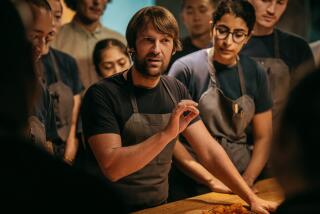Review: ‘The Man Who Changed the Way We Eat’ by Thomas McNamee
- Share via
The Man Who Changed the Way We Eat
Thomas McNamee
Free Press, 339 pp., $27
Ask your average Food Network viewer or Yelp poster about Craig Claiborne and you’re likely to be met with a blank look and a “Who?”
How fleeting is fame in the food world. Claiborne is one of the giants of this modern age, even if today — less than 20 years after his passing — he is largely forgotten. People remember James Beard because of the foundation that keeps his name alive. Julia Child lives on in television reruns (even if some fans now believe she looked just like Meryl Streep).
In his time Craig Claiborne was regarded as at least their equal, and, indeed, when it came to power, not popularity, he was miles ahead of Beard and Child.
Claiborne was the food editor and restaurant critic at the New York Times from 1957 to 1988 — with a couple of brief hiatuses — and if any one person can be said to have created the modern American food world, it is he.
When restaurant critics today dine incognito, pay for their own meals and make repeated visits before issuing their opinions, they are simply following in his footsteps.
When you look at a newspaper food section — or a national food magazine for that matter — and find not just stories about celebrated chefs at fine-dining restaurants but also articles about talented home cooks, explorations of the cuisines of different cultures and even news about the food business, that is in large part Claiborne’s doing as well.
He wrote or co-wrote 26 cookbooks, including a couple of classics. The list of food-related authors he helped discover is even more amazing — Marcella Hazan, Diana Kennedy, Madhur Jaffrey, Jacques Pepin, Paul Prudhomme, Pierre Franey and even Child herself.
Not bad for a little guy raised in a boardinghouse in Sunflower, Miss.
Add in that he was a most complex character, alternately prim and shy and crude and outgoing, as well as being a public figure and a homosexual at a time when being the latter was still illegal in most states, and you should have the subject of a most fascinating biography.
Unfortunately, in the case of Thomas McNamee’s frustrating “The Man Who Changed the Way We Eat,” that promise is only partly fulfilled.
McNamee, who also wrote “Alice Waters and Chez Panisse,” hits the highlights of Claiborne’s peculiar character, but ultimately fails to make much sense of it. Furthermore, much of what he does reveal has long been hidden in the plainest of sight.
Indeed, one problem anyone writing about Claiborne’s life must face up to is that most of his dirty laundry has already been aired — by Claiborne himself. After his remarkable memoir “A Feast Made for Laughter,” it’s hard to imagine what secrets could be left to reveal. After all, any book that includes a recounting of a sexual relationship between a boy and his father pretty much defines “tell-all.”
Add in Claiborne’s private papers (which seem to be a hodgepodge of memos, notes, receipts and calendars donated to Boston University), the autobiographies of Claiborne’s close friends Franey and Pepin, and interviews with a few more, and that seems to be pretty much the extent of what McNamee has been able to turn up.
More frustrating is that in most cases he settles for recounting the facts but never quite connecting the dots.
Sometimes McNamee drops hints but doesn’t follow up. Toward the end of the book, he notes the increasing frequency of appointments at the New York Times offices in Claiborne’s daybook, which seems portentous — but leaves the import hanging. Certainly there must be someone left at the newspaper who could have filled him in on what was going on.
And when he does stretch for revelation, well, Katie bar the door. Things get real weird real fast. Tones shift on a dime from a fairly dry “just the facts” recitation to something approaching Faulknerian hallucination.
After recounting at some length Claiborne’s brief, quixotic flirtation with buying a vacation home in New Mexico, in which Claiborne mentions in a letter that he’s unsure what the water-rights part of the sales contract means, McNamee interjects out of nowhere a faux good-old-boy rant: “What that means, Craig, old buddy, is you ain’t ready for prime time in the West, where whiskey’s for drinkin’ and water’s for fightin’.”
Uh, right. Thanks.
Maybe even more odd are the quirks and contradictions that McNamee doesn’t seem to be all that curious about. Claiborne was a complex man. Almost unfailingly helpful to others but utterly ambitious. Prim and proper but given to raging fits when drunk. A man who treasured his friendships yet ended up alienating almost everyone close to him. Someone who delighted in socializing with the chefs he covered but basically invented the ethical rules for restaurant critics.
These contradictions are reported by McNamee, certainly, but not really explored. Yet you get the feeling that it is in these gaps that the truth about Claiborne is still waiting to be found. In the end, we’re still left wondering what made this great, curious man tick.
Parsons is The Times’ food editor.
More to Read
The biggest entertainment stories
Get our big stories about Hollywood, film, television, music, arts, culture and more right in your inbox as soon as they publish.
You may occasionally receive promotional content from the Los Angeles Times.











